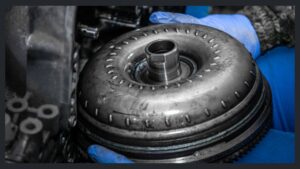
5 Symptoms of a Bad Torque Converter
A torque converter is needed to transfer the rotational power of your engine to your vehicle’s transmission. The torque converter sits between the engine and the transmission.
This area contains the flexplate on which the torque converter mounts. As the crankshaft moves, the flexplate rotates, transferring torque energy from the engine to the transmission.
When a problem occurs with the torque converter, people often mistake the symptoms for a problem with the transmission itself. This is a very costly assumption since having a mechanic replace the transmission can cost thousands of dollars for a new transmission.
It would be much cheaper to just replace the torque converter. Therefore, knowing the signs of a faulty torque converter can save you a lot of money.
5 Most Common Symptoms of a Torque Converter Failure Here are the 5 most common symptoms that indicate a faulty torque converter.
1) Abnormal noises
A faulty torque converter will make a whistling or rattling noise. These noises will be louder when driving than when parked. But as soon as you switch from parking to driving, the noises become louder and more frequent. Either way, you need to take these noises seriously.
2) Speed Changes
You may notice a sudden decrease or increase in the acceleration of your vehicle while driving. This happens if the torque converter is defective and the output pressure is inconsistent.
If you have to drive in difficult weather conditions, it can be very dangerous if this problem occurs. 3) Shaking
If you feel your car wobbling when accelerating up to about 40 mph, you may have a problem with the torque converter. It may feel like you’re driving on a bumpy road.
There’s no warning when this will happen either. However, if this is the first time it’s happened, take your vehicle to a mechanic right away. This issue could also be an indication of a problem with the suspension or tires, but you should still have it inspected. 4) Gearbox slippage
When the torque converter is defective, it cannot control the amount of transmission fluid it pumps into the transmission well. Sometimes it pumps too much oil, and sometimes it doesn’t have enough.
As a result, the gears in the transmission slip and acceleration decreases. This means that more fuel is used and the vehicle’s fuel consumption is reduced.
However, even small amounts can cause this symptom, so make sure you have a sufficient amount of transmission fluid in the system. 5) Switching Problems
If the torque converter is defective, the output pressure will be reduced. This means that shifts will feel very soft or very slow. Over time, shifts will feel very hard and rough.
The only way to reverse this is to improve the torque converter output pressure. To do this, you need to have higher engine speeds. However, this will require a new torque converter.
What causes a torque converter to fail?Torque converters can fail for a variety of reasons, but the most common cause is a fluid leak, possibly due to a faulty seal. Low fluid levels can cause the converter to overheat due to friction and eventually break down.
Another common cause of failure is the buildup of dirt and debris in the fluid. This can cause clogs and restrict the flow of hydraulic power. Finally, a faulty clutch solenoid can cause a torque converter to fail.
Can a faulty torque converter damage your transmission? The short answer is, yes, a faulty torque converter can indeed damage your transmission. If the torque converter doesn’t function properly, it can cause the transmission to overheat and eventually fail.
In addition, a faulty torque converter can put additional stress on the transmission gears, potentially leading to failure.

